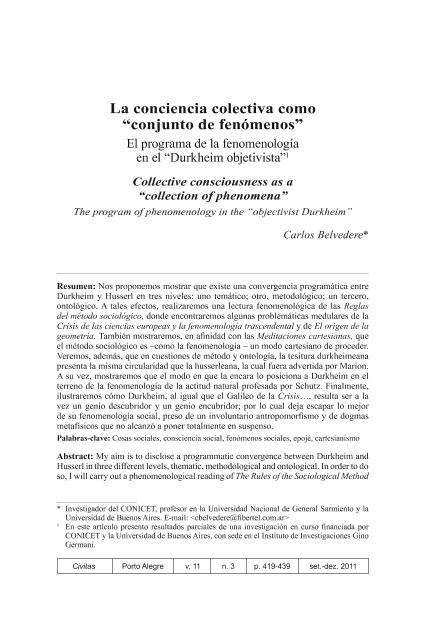Mostrar el registro sencillo del ítem
dc.contributor.author
Belvedere, Carlos Daniel

dc.date.available
2023-03-21T15:20:14Z
dc.date.issued
2011-11
dc.identifier.citation
Belvedere, Carlos Daniel; La conciencia colectiva como “conjunto de fenómenos”: el programa de la fenomenología en el “Durkheim objetivista”; Pontifícia Universidade Católica do Rio Grande do Sul; Civitas; 11; 3; 11-2011; 419-439
dc.identifier.issn
1519-6089
dc.identifier.uri
http://hdl.handle.net/11336/191209
dc.description.abstract
Nos proponemos mostrar que existe una convergencia programática entre Durkheim y Husserl en tres niveles: uno temático; otro, metodológico; un tercero, ontológico. A tales efectos, realizaremos una lectura fenomenológica de las Reglas del método sociológico, donde encontraremos algunas problemáticas medulares de la Crisis de las ciencias europeas y la fenomenología trascendental y de El origen de la geometría. También mostraremos, en afinidad con las Meditaciones cartesianas, que el método sociológico es –como la fenomenología – un modo cartesiano de proceder. Veremos, además, que en cuestiones de método y ontología, la tesitura durkheimeana presenta la misma circularidad que la husserleana, la cual fuera advertida por Marion. A su vez, mostraremos que el modo en que la encara lo posiciona a Durkheim en el terreno de la fenomenología de la actitud natural profesada por Schutz. Finalmente, ilustraremos cómo Durkheim, al igual que el Galileo de la Crisis…, resulta ser a la vez un genio descubridor y un genio encubridor; por lo cual deja escapar lo mejor de su fenomenología social, preso de un involuntario antropomorfismo y de dogmas metafísicos que no alcanzó a poner totalmente en suspenso.
dc.description.abstract
My aim is to disclose a programmatic convergence between Durkheim and Husserl in three different levels, thematic, methodological and ontological. In order to do so, I will carry out a phenomenological reading of The Rules of the Sociological Method in search of some core ideas of The Crisis of European Sciences and Transcendental Phenomenology and of The Origin of Geometry. I will also show, in accordance with Cathesian Meditations, that the sociological method is, in as much as phenomenology, a carthesian way. Then I will explain that Durkheim's methodological and ontological stances present the same circularity as Husserl's in Marion's analysis. Then I will put on view that the way in which Durkheim faces it situates him in the phenomenology of the natural attitude undertaken by Schutz. Finally I will illustrate how Durkheim, just as Galileo according to Crisis…, is at a time a disclosing and a concealing genius and that's the reason why he lets go the best of his social phenomenology, holding to a thoughtless anthropomorphism and to metaphysical dogmas which he didn't get to put into brackets.
dc.format
application/pdf
dc.language.iso
spa
dc.publisher
Pontifícia Universidade Católica do Rio Grande do Sul

dc.rights
info:eu-repo/semantics/openAccess
dc.rights.uri
https://creativecommons.org/licenses/by-nc-nd/2.5/ar/
dc.subject
CONCIENCIA COLECTIVA
dc.subject
COSAS SOCIALES
dc.subject
FENÓMENO
dc.subject
FENOMENOLOGÍA SOCIAL
dc.subject.classification
Otras Humanidades

dc.subject.classification
Otras Humanidades

dc.subject.classification
HUMANIDADES

dc.title
La conciencia colectiva como “conjunto de fenómenos”: el programa de la fenomenología en el “Durkheim objetivista”
dc.title
Collective consciousness as a “collection of phenomena”: the program of phenomenology in the “objectivist Durkheim”
dc.type
info:eu-repo/semantics/article
dc.type
info:ar-repo/semantics/artículo
dc.type
info:eu-repo/semantics/publishedVersion
dc.date.updated
2023-03-20T14:58:46Z
dc.identifier.eissn
1984-7289
dc.journal.volume
11
dc.journal.number
3
dc.journal.pagination
419-439
dc.journal.pais
Brasil

dc.journal.ciudad
Porto Alegre
dc.description.fil
Fil: Belvedere, Carlos Daniel. Consejo Nacional de Investigaciones Científicas y Técnicas; Argentina. Universidad Nacional de General Sarmiento; Argentina. Universidad de Buenos Aires; Argentina
dc.journal.title
Civitas

dc.relation.alternativeid
info:eu-repo/semantics/altIdentifier/url/https://revistaseletronicas.pucrs.br/ojs/index.php/civitas/article/view/10057
dc.relation.alternativeid
info:eu-repo/semantics/altIdentifier/url/https://www.scielo.br/j/civitas/a/yYKfdHwkhXFzNDRDRn6XxtJ/?lang=es
dc.relation.alternativeid
info:eu-repo/semantics/altIdentifier/doi/https://doi.org/10.15448/1984-7289.2011.3.10057
Archivos asociados
